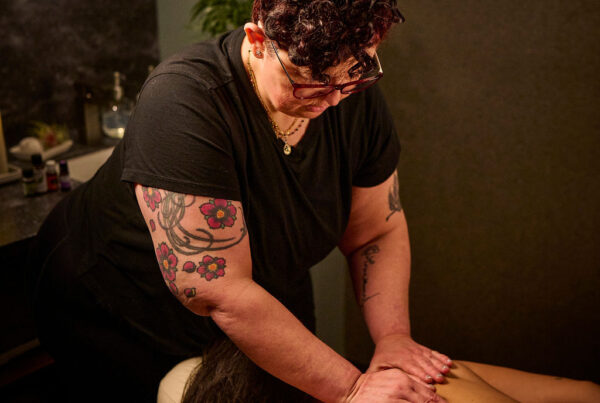One of the most critical components of cultivating body positivity is our self-talk. When we speak to ourselves with compassion, we are more able to celebrate our bodies for their inherent beauty and recognize all they provide!
The goals we choose for ourselves can play a huge role in our self-talk. Consider 2 options.
Option A: My goal is to lose 10 pounds in 10 weeks with a prescribed nutrition plan and exercise 3-4 times per week.
You set your 10-pound goal. You follow your nutrition plan the best you can. You stick to your exercise as best you can. You sometimes log your food but maybe don’t finish a full day, or maybe you skip weekends. You have an idea that you’ll get to the gym M-W-F, but sometimes you work late and tell yourself you’ll make it up on the weekend. You have a lot of commitments, and sometimes that doesn’t happen.
BUT, you get on the scale every single day because it’s in your bathroom, and your goal is to lose 10 pounds.
You get to your 10-week mark. You step on the scale. You already know where you are because you’ve been checking every day. Maybe you’ve extended your end date to try to compensate. But how do you feel when you step on the scale and haven’t hit the 10-pound loss?
Sometimes fine, I agree. But if this goal was important to you, or if you’ve tried several times without success, you might feel totally gutted. At the very least, frustrated. How do you talk to yourself? Whatever the narrative is, the summary is likely to be: “not enough.” And what about all the work you put in? Useless, because your goal was to lose 10 pounds and it didn’t get you there.
Logically in your mind, you know that exercise and eating right is great for you, but there is the piece of you that says – why do I even bother? Why don’t I just eat pizza every night then?
Option B: My goal is to practice 8 healthy habits per week with at least 80% success for the next 6 months through daily and weekly habit tracking.
You choose 8 healthy habits that symbolize healthy living for you and give them some guidelines. Ideally, they are already things you like and enjoy doing; there may be one or two new ones you’ll try to implement over the next few months. For example:
- Get 5 servings of fruits and veggies daily
- Complete 3 30-minute strength training sessions per week
- Write in a journal for 30 minutes per week
- Foam roll and stretch for 10 minutes pre- and post-workout 3 times per week
- Hike or walk with the family once a week for an hour (Saturdays)
You develop a system of tracking those habits: in an app like Strides or Tally, or in a dedicated paper planner. Every day (or every couple of days) you update your tracking with what you completed for the day. This is the hard part, by the way. This is where defining the importance of health and what it means to you becomes very important. Visualizing what these practices are serving you will help you tap into the internal motivation you need to keep up with tracking.
At the end of the week, you total how many days you completed each activity.
- Get 5 servings of fruits and veggies daily: If you got them in 6 out of 7 days, you completed this 86% of the time
- Complete 3 30-minute strength training sessions per week: Did you hit 2 out of 3? 67%.
- Write in a journal for 30 minutes per week: Crushed that one on Sunday night. 100%
How did you do on average for the week? 86+67+100% / 3 = 85% success rate!
Does this seem like a lot of math? It probably is. But it’s a temporary process of holding yourself accountable to your own goals until they become more inherent and habitual to you.
And how do you feel if, on a weekly basis, your success rate is 85%? You’re exceeding your goal. Doing better than you thought you would. Maybe you’ll get competitive with yourself and shoot for 90% next week. That involves making time for more of the healthy habits you’re already enjoying.
Change Your Game, Change Your Life
Compare the self-talk of success in Option B to the one of defeat in Option A. How much more love can you give yourself from a place of exceeding your own expectations, as opposed to a place where you “failed?”
By focusing on your habits rather than the outcome, you’ll be more open to build a positive relationship with yourself and your body while doing exactly what you need to be doing for long-term health. Your weight may change, and it may change at a pace you’d prefer was ultimately faster. But by shifting your mindset, your entire journey can metamorphize from one of self-doubt and comparison to self-compassion and success!







